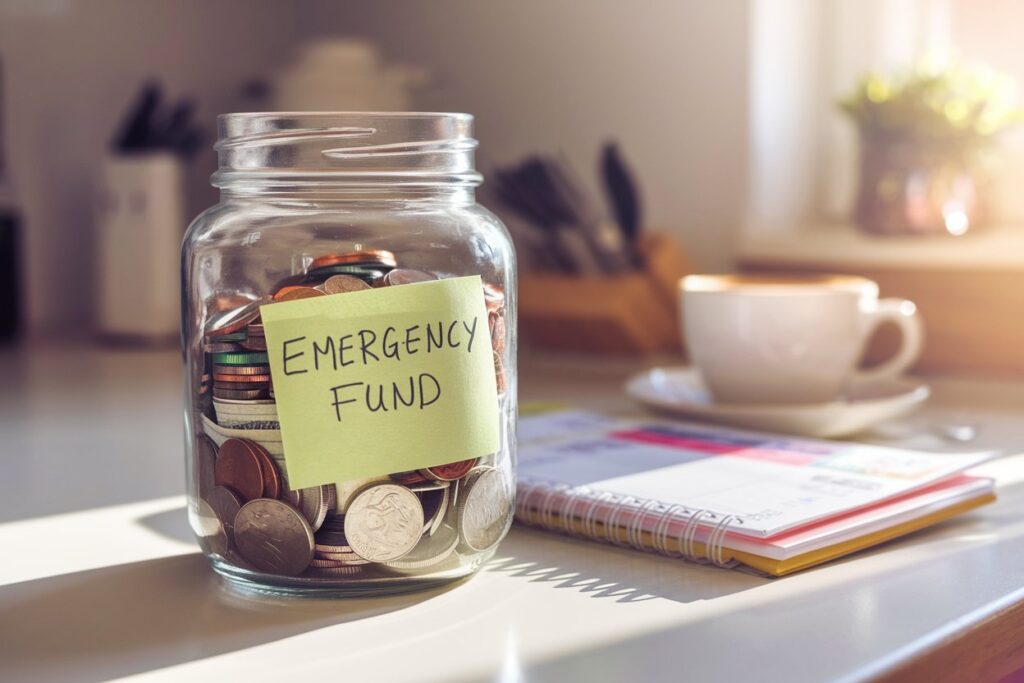Ever wondered, “Why am I broke?” You’re not alone. Many people face financial struggles, leading to frustration and doubt about their future. The truth is, being broke can stem from many reasons. Understanding these reasons is the first step to financial stability.
Let’s take a closer look at why you might be facing some financial struggles and how you can start to control your money with confidence.
The first step is understanding what’s really going on. Really look at your finances and ask yourself, “Why am I broke?”. Maybe it’s overspending, not being sure how to manage money, or feeling weighed down by debt—these are all common issues that can make it tough to get ahead. Debt, in particular, can really affect your financial well-being, making it hard to plan for the future. But don’t worry, it doesn’t have to stay this way. With a few thoughtful changes, like building an emergency fund and creating a solid budget that works for you, you can get back on track and start moving toward the financial freedom you deserve.
As an Amazon Associate, I earn from qualifying purchases, as well as commission via other affiliate links in this post. This is at no extra cost to you! Read the full disclosure here.
Why Am I Broke? Understanding the Root Causes of Financial Struggles
Many of us find ourselves struggling to achieve financial stability, and it’s easy to feel frustrated when trying to figure out why. If you’ve ever asked yourself, “Why am I broke?” Rest assured, you’re not alone. In fact, understanding the reasons behind these financial struggles is the crucial first step toward getting back on track. For many, it often boils down to issues like overspending or a lack of financial knowledge. By identifying these root causes, you can start taking meaningful steps toward better managing your money.
Overspending: The Silent Budget Killer
Overspending can really sneak up on you and mess with your finances—I’ve been there, trust me! It might mean grabbing things on impulse, eating out more than you planned (yep, that used to be me!), or getting caught up in the latest trends. Little by little, these habits can drain your budget and leave you feeling totally overwhelmed.
When I first decided to take a deep dive into where my money was going, I started by tracking every single expense. Initially, I was shocked to discover just how much I was spending on eating out each month. However, this simple step quickly opened my eyes to a deeper problem—not only was I overspending on dining, but I was also making impulsive purchases in other areas without even realizing it. As I continued to track my expenses, I began to see patterns in my spending habits. This newfound awareness allowed me to make smarter decisions and, ultimately, regain control over my finances.
Learning to budget and manage your money is absolutely vital if you want to take back control of your finances. Simply put, it’s like mapping out your money journey. At first, it might seem overwhelming, but as you start learning more about managing your money, you’ll gradually feel more confident and in control. In fact, the more you stick with it, the clearer things will become. Even though it may feel tough in the beginning, don’t give up. Over time, you’ll be surprised at how quickly things start to shift in your favor, and you’ll realize just how powerful small changes can be.
Cutting Costs: Small Changes, Big Savings
Controlling your finances begins with finding ways to cut costs. By making even small lifestyle changes, you can gradually save a significant amount over time. For instance, simply adjusting your daily habits, such as cooking more meals at home or cutting back on unnecessary subscriptions, can add up to big savings. As you continue to make these adjustments, you’ll start to see how every little bit helps, leading to more control over your financial situation.
Here are some tips:
- Evaluate your spending – Track your daily expenses to find where you can save, like on dining out or impulse buys.
- Prioritize your needs – Know the difference between needs and wants. Meet your basic needs first.
- Embrace a more frugal mindset – Think about each purchase carefully. Don’t spend without a reason.
- Explore cost-cutting alternatives – Find ways to save on daily costs, like packing lunch or using public transport.
By gradually changing your lifestyle choices and spending habits, you can save a significant amount, which, in turn, will greatly improve your financial health. Achieving financial stability doesn’t happen overnight; it starts with small, manageable steps. For example, being mindful of your budgeting and finding ways to save money may seem minor at first, but over time, these habits build up and lead to a more secure future. Ultimately, every bit of effort you put into managing your finances today paves the way for a brighter tomorrow.
Lack of Financial Literacy: Knowledge is Power
A lack of financial education is a significant hurdle for many people when it comes to managing money effectively. Without a solid understanding of essential concepts such as budgeting, saving, and debt management, it’s all too easy to fall into financial traps. Consequently, these traps can prevent you from reaching your goals. Therefore, taking the time to educate yourself about these crucial topics can be the key to unlocking a more secure financial future. By equipping yourself with this knowledge, you can navigate potential pitfalls. This will create a path toward achieving your financial aspirations.
Many people also miss out on opportunities to grow their wealth through investing because they simply don’t know where to start. The truth is, knowledge is power—educating yourself on the basics of personal finance can make a huge difference in your financial well-being. The Consumer Financial Protection Bureau is a great source of reliable information on managing debt, understanding credit, and learning about your rights as a consumer. By taking the time to learn how to budget, among other skills you can build a solid foundation for a more secure financial future.

Why Am I Broke? The Impact of Debt on Your Financial Well-being
Debt can deeply affect your financial health. It includes credit card debt, student loans, and other loans. The need to repay can cause a lot of stress and strain, both emotionally and financially, as it often leads to constant worry about making ends meet and keeping up with payments.
The Fast-Growing Problem of High-Interest Debt
High-interest debt, like credit card debt, can grow fast. This makes it hard to pay off the original amount. You might end up in a cycle of making minimum payments and watching your debt grow.
Debt can significantly impact your credit score, especially if you struggle to keep up with payments. A low credit score can make it difficult to qualify for loans, and even if you do, you’re likely to face higher interest rates and less favorable terms.
This can create a cycle where borrowing becomes more expensive, making it harder to pay off existing debt and save for the future. A poor credit score doesn’t just limit your ability to get loans; it can also affect your chances of renting a home, securing a job, or even getting better rates on insurance. In short, debt can close doors to many financial opportunities, making it even more challenging to get back on track.
The Psychological Impact of Debt: Stress and Well-being
Debt’s psychological impact is also important. Worrying about payments and the fear of falling even more behind can harm your mental health. This stress can affect your relationships, work, and most importantly your overall quality of life.
Strategies for Managing and Reducing Debt
To lessen debt’s impact, you need a solid plan to manage and reduce it. This might mean focusing on high-interest debt, talking to creditors, or looking into debt consolidation. Good financial habits, like budgeting and cutting expenses, can also help you take back control of your finances.
Understanding debt’s impact on your financial health is key. By taking action, you can work towards a more stable financial future. Overcoming debt is a journey, but with the right approach (and persistence!), you can regain control of your finances and find lasting peace of mind.

Why Am I Broke? The Importance of Emergency Funds and Savings
Building an emergency fund and saving regularly are key steps to financial stability. These steps help protect you from whatever unexpected challenges life throws at you. They act as a safety net, making sure you stay financially secure.
Building a Financial Safety Net
An emergency fund is a special savings account for unexpected costs, like medical bills or job loss. It helps avoid using high-interest credit cards or touching long-term savings. This is critical for keeping your financial stability intact.
Having a savings account is also essential for long-term financial health. By following the “pay yourself first” rule and setting aside a portion of your income regularly, you can build a solid financial safety net. This habit not only helps you prepare for unexpected expenses but also provides a cushion for major purchases and brings you closer to your financial goals.
Here are some essential steps to help you grow your savings:
- Start an emergency fund with 3-6 months’ living expenses.
- Automate savings to make it a routine.
- Look for high-yield savings options to grow your emergency fund and savings.
- Check and update your savings goals often to match your long-term financial stability.
By focusing on an emergency fund and saving, you shield yourself from unexpected expenses. This approach not only brings peace of mind but also sets the stage for long-term financial stability.
Final Thoughts: Why Am I Broke?
Taking control of your finances can feel overwhelming, especially when you’re constantly asking yourself, “Why am I broke?” It all starts with understanding where things went off track. Maybe it’s overspending, juggling too much debt, or not having a clear budget—whatever the cause, knowing it is the first step toward change. Debt can really weigh you down, but it doesn’t have to keep you stuck forever. Building up an emergency fund and making a habit of saving, even if it’s just a little bit at a time, can give you the cushion you need to breathe a little easier.
Remember, it’s okay to feel frustrated or overwhelmed. We’ve all been there. The important thing is that you’re willing to make a change, and that’s huge. So, be patient with yourself, take it one step at a time, and know that every little effort gets you closer to a more stable, stress-free financial future. You’ve got this!







